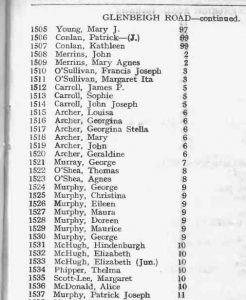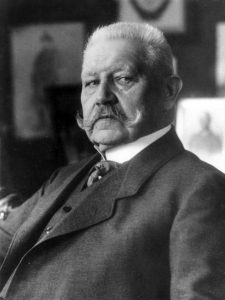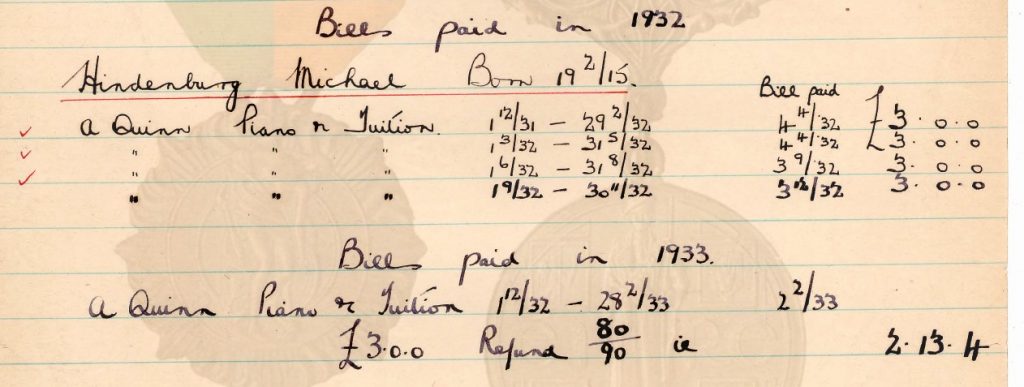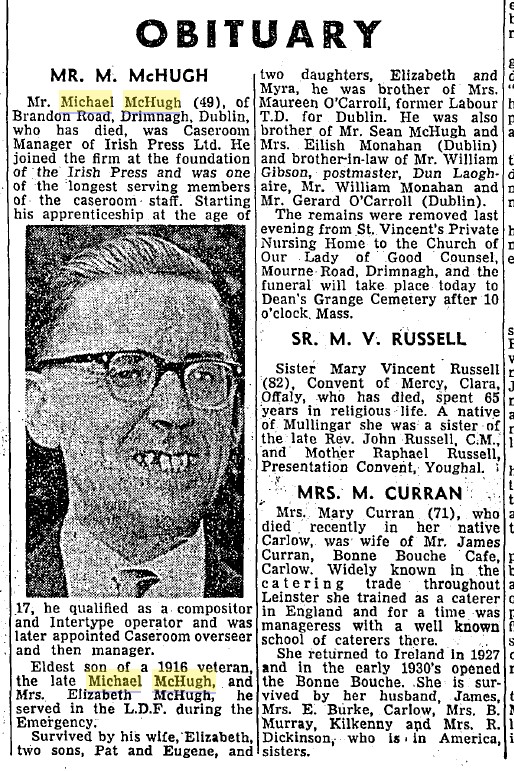One of the first lessons you learn as a genealogist is that all names are equal. So you keep a straight face when you come across ‘Gelida Winterbottom’ or ‘Annette Curtin’.

Still, there are names that stick in the memory. I first came across Hindenburgh McHugh about ten years ago doing quality assessment on the Dublin city twentieth-century voters’ lists. There he was at 10 Glenbeigh Road in Cabra in 1939, large as life. Clearly, he had been christened during the First World War by parents who were not on the side of the Allies – Paul von Hindenburg was the commander of the German Army from 1914 to 1918. This was a noisy raspberry blown in the face of Britain, the equivalent of calling a child “Winston” in Nazi Germany.

A name like that should jump out of the birth registrations. But no, not a trace. So I asked myself how else would someone use a registration for protest. Insist on the Irish language? Sure enough, there he was on February 15 1915, ‘Hendenburg Michaél Mac Aodha’, son of Michaél Mac Aodha, Linotype operator, and Eilis née Ní Dubhda. Two noisy raspberries to Britain.
 An Irish-speaking anti-British printer in Dublin in 1915? You can almost smell Sinn Féin. And there in the militaryarchives.ie pensions collection was a 400-page file relating to the battles of Michael’s widow to secure a pension. He died in 1924 from TB contracted when he was imprisoned at the end of the War of Independence, having fought in North King Street in the Easter Rising. Her campaign was eventually successful and the process produced enough material for a full-scale biography.
An Irish-speaking anti-British printer in Dublin in 1915? You can almost smell Sinn Féin. And there in the militaryarchives.ie pensions collection was a 400-page file relating to the battles of Michael’s widow to secure a pension. He died in 1924 from TB contracted when he was imprisoned at the end of the War of Independence, having fought in North King Street in the Easter Rising. Her campaign was eventually successful and the process produced enough material for a full-scale biography.

But what of Hindenburgh himself? The name appears only once in the voters’ lists, in the very earliest surviving volume. But a ‘Michael McHugh’ appears in Glenbeigh Road later in the 1940s. The Second World War was very different to the First. Perhaps it might have been more politic not to have the name of the man who had invited Hitler to become Reichskanzler. Or maybe he just got fed up with the hassle. The Johnny Cash Boy-Named-Sue school of child-rearing can be very tiresome.
A search of death records up to the 1960s turned up a Michael McHugh of about the right age registered in 1964, listed as “Manager, Case room, Irish Press”.  The Irish Press obituary (at irishnewsarchive.com) included a photograph and a full account of his own life and of his father’s part in the War of Independence. No mention of his first name, though.
The Irish Press obituary (at irishnewsarchive.com) included a photograph and a full account of his own life and of his father’s part in the War of Independence. No mention of his first name, though.
 There are two lessons. First, if you want your descendants to be able to find you easily, call your children something conspicuous. I suggest “NotDonald” or “NotBoris”. Second, I appear to have too much time on my hands.
There are two lessons. First, if you want your descendants to be able to find you easily, call your children something conspicuous. I suggest “NotDonald” or “NotBoris”. Second, I appear to have too much time on my hands.
John, I really look forward to your blogs. Great reading. Keep them coming & happy Christmas 🙂
I am almost certainly the only Sheelin Prinzinger in the entire world. After 20 years if searching Marys and Johns, Burke’s and Blacks, I imagine I will be the ancestor that stands out. What fun! But I don’t recommend future parents follow suit unless they want their child to constantly spell their name.
Lovely blog John. Have you ever heard of Lazarus Molloy , the former Offaly footballer? He could never lie down for too long on the pitch!
What a great story. One for the Christmas dinner table which I will be sure to share, with credit to you, of course. Thanks for your persistence in unearthing this.
Dear John,
I always get a kick out of your blogs, you impart your vast knowledge of all things allied to genealogy in combination with your wonderful sense of humour. In the 1970s my wife and I named our son Rudi after his Austrian grandfather Rudolf. We live in County Limerick and imagine our surprise when years later we discovered by chance, that there was another Rudi Kennedy living only twenty miles away.
Happy Christmas,
John Kennedy
Too fun! Very much enjoy your posts and research – but especially enjoy your writing!
I can sympathize, I have a German ancestor named Simplizius Simon (like Simple Simon of nursery rhyme fame!) and an Irish forebear named Walter Mitty. Forgot to mention also James Bulger (hopefully no relation to Whitey!) Always enjoy your blog John, Merry Christmas!
Would Maureen O’Carroll TD, mentioned in the Irish Press obituary as Michael McHugh’s sister, be the mother of comedian Brendan O’Carroll?
Yes indeed. Which would make Hindenburg Michael Brendan O’Carroll’s uncle.
Interesting that the first image that comes up in an American’s mind when we hear the name “Hindenburg” is not Paul von Hindenburg – but the Hindenburg disaster of 1937. It was a fatal explosion of a German zeppelin in New Jersey that an abrupt end to any new age of airship travel …
My grandparents left Ireland to live in London, England just after their marriage in 1899 (actually, it would seem from union membership records, that my grandfather had gone over some time beforehand, presumably to secure a job and accomodation). Although my mother, along with her six sisters and one brother, were all born in England, they always regarded themselves as Irish, rather than English (the surname O’Sullivan was no doubt partly responsible). And so they had a tendency to regard enemies of England as friends of the Irish, as least those in the past (I don’t believe they had any sympathy for Hitler or the Nazis during the 1930’s, for instance, although I suspect they rooted for Ghandi). All of which leads up to this – there was a tune my mother used to sing around the house which was supportive of the Boers and Paul Kruger, which may have been popular around the time my grandparents left Ireland. It was strange that my mother sang the song (which I’m sure she’d heard as a child), given that she was bitterly opposed to the apartheid system in South Africa. In any event, at least neither my mother nor her siblings were given names like “Hindenburg”.
Great info – thanks.
Happy Christmas
One of my Irish ancestors was named Anastasia. I was sure she would be the only one so named, born about 1818. But, no, for that same time period, I have found one or two others named Anastasia. Perhaps some Russian influence in early nineteenth century Ireland?
Hi John,
My paternal grandmother was Anastasia Dooley from Waterford city (b.1884).
I believe there was a St. Anastasia and it was not an unusual name in Irish Catholic families.
John I love your posts – please keep them comming in the New Year.
Happy Holidays and Happy New Year to you!
Rob
Best name award goes to Ima Hogg from Houston, Texas (1882-1975). Rumored that she had a sister named Ura Hogg, but that was not true. He father was “Big Jim” Hogg. A friend of mine met Ima when he was a member of the Houston symphony. At first I thought he was pulling my leg, but it was true. Many of Hogg families in Derry county, but no Ura Hogg.
I have a couple of collateral ancestors who were both given the middle name of ‘Napoleon’: Patrick Napoleon Gaffney; and Thomas Napoleon Hourigan. Both born in Canada; both born in 1857; both born to Irish RC families. Given that the families belonged to Ottawa-area Catholic parishes that were a mix of Irish emigrants and French Canadians, I suppose it’s possible that the Irish parents of Patrick and Thomas were influenced by their French-Canadian neighbours in their choice of the name ‘Napoleon’? But I don’t generally see this kind of French influence in their naming practices (nobody named Patrick Pierre or Bridget Evangeline, or etc.).
Patrick Napoleon was apparently known throughout his life as ‘Napoleon Gaffney,’ which strikes me as a somewhat incongruous name! (though, of course, all names are equal…).
Also: in my family tree, the name ‘Emmet/Emmett’ first appears in 1880, last appears in 1920, with a cluster of Emmets/Emmetts born in the late 1880s to early 1900s (Emmet James Fagan; Emmett Patrick Finnerty; James Emmet Hanlon; Emmett Patrick Sloan; etc.). This one very obviously political: they were naming their sons after Robert Emmet.
40 or 50 years earlier, when they first emigrated to Canada, they did not use any such politically-charged names, which is sort of interesting.
Hi Tom, there were lots of Anastasias around Kilkenny town in the 1700s and 1800s including some of my ancestors. I presume it was the same over the rest of the county and Leinster at least. In church records it was abbreviated as Anty. There are still some Stasias in Kilkenny. In a graveyard in Kilkenny town, near where my ancestors were buried, there is a monument to Anastacia Tobin from the 1500s who was business woman in her time. She is depicted on the stone in a medieval, pleated dress. A Greek saint’s names that was popular in medieval Kilkenny that has continued (just about) to the present day.
Brilliant find (OK, yet another one), John!
Cheered me up no end during a bout of flu.
Only jealous about 2 things: (a) I didn’t discover the story; (b) I can’t feature the McHughs in our blog commemorating the men who did the Burning of the Custom House, 25 May 1921.
Then again, since there were hundreds of Dublin Brigade on that operation, who’s to say Hindenburgh’s dad wasn’t involved. So we might just cheat and post a link to your article. It more than deserves that.
Have a good 2020, keep up your great work.